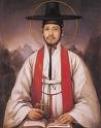Saints of the Day – Korean Martyrs
If you ever wonder about the power of books, the church in Korea owes its start to them. It is probably unique in this regard. Korea was closed to outside trade and influences at the time. Unfortunately, this is still the case in Communist North Korea, the Democratic People’s Republic of Korea. The Christian books were obtained by Korean scholars from the Korean embassy in China. The first convert Ni-seoung-houn was baptized in 1784 in Beijing, where he had gone to study Catholicism. He returned to Korea and converted many others. Most of these first Christians were later killed in 1791. However in 1794, when a Chinese priest, Fr. James Tsiou, arrived, he found 4,000 Catholics. Subsequent waves of persecution and martyrdom followed in 1836, 1846, and 1867. The martyrdom of French missionaries, in part, led to to a war called the French Campaign Against Korea.
Their stories are compelling. It is especially interesting to see how a sacramental and liturgical church can grow without any ordained clergy. It is even more interesting how they adapted with relative ease to a foreign clergy and developed their own.
Pope John Paul II canonized (designated as saints) the martyrs of 1836, 1846, and 1867 in Seoul on May 6, 1984. The Pope began his homily with Luke 24:26 from the story of the disciples on the way to Emmaus after the death of Christ. “Was it not necessary that the Christ should suffer these things and enter into His glory?” He went on to relate the rest of this story of encouragement and also incorporated a history of the church in Korea. and the testimony of the martyrs.
The faith demonstrated by these Christians, and their statements prior to their deaths, are very reminiscent of the early Church. They should also be a reminder that in many parts of the world today, Christians are still being persecuted. In China, Sudan, and even Latin America, the faith remains something to die for.










